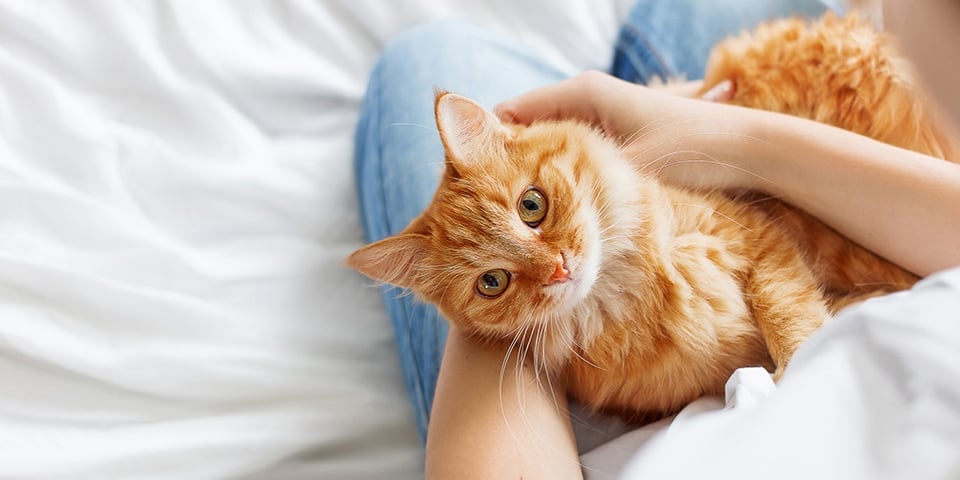Can cats sense pregnancy? Feline myths and facts

Your cat has been sleeping on your lap (a lot), gently pawing your belly more and acting, well, unusual. You remember hearing someone once say that cats can sense pregnancy. You look at your cat. Your cat looks at you. You begin to wonder…
A lot of people claim cats behave differently around those who are pregnant. Is this claim even true? Because if it is, you probably have a lot of follow-up questions. Like, How soon can cats sense pregnancy? What are the signs your cat knows you are pregnant? What do cats do when they sense you're pregnant? Let's take a closer look.
In this article
- So, can cats sense pregnancy in humans? No, not really.
- Are there signs your cat knows you are pregnant? My cat is acting weird.
- Can my cat smell pregnancy?
- So why do cats get clingy when you’re pregnant?
- Can cats sense that something is changing when you get pregnant?
- Still side-eyeing your oddly affectionate cat?
- Can pregnant women be around cats?
- Related Blog Content
So, can cats sense pregnancy in humans? No, not really.
The truth is, there is no hard scientific evidence that changes in your cat’s behavior are an indication that they think you’re pregnant.
But when was the last time cats paid attention to what scientific researchers think of them? Your body does go through a lot of changes in early pregnancy, and cats are notorious for paying attention to even the smallest changes in their environment. So if your furry friend is acting odd, it’s definitely not weird to wonder if they’ve noticed some differences in you.
Are there signs your cat knows you are pregnant? My cat is acting weird.
Some people believe certain behavioral changes in cats can hint that they know about your pregnancy. Do cats get clingy when you’re pregnant? Some people claim they do. Others say they sleep on your belly, paw your belly, bring you gifts, ignore or withdraw from you and/or act out. However, these behavioral changes may also happen for a wide range of other reasons.
Can my cat smell pregnancy?
No, but this is probably the No.1 question you’ll hear related to cats and pregnancy. Cats do have a keen sense of smell, especially compared to humans. Whereas we have 5 million odor-sensitive cells in our noses, cats have 200 million.1 But it’s worth noting that cats don’t rely on their sense of smell as much as other animals do.2
Folks claim that cats can smell a change in hormones when you’re pregnant. Your hormone levels do change during pregnancy, especially in the early stages. Once a fertilized egg is implanted, it will start producing increasing amounts of the human Chorionic Gonadotropin (hCG) hormone, which keeps your estrogen and progesterone levels high. This prevents your uterine lining from shedding.
However, there are no studies that prove increased levels of hCG will make you smell differently to a cat.
So why do cats get clingy when you’re pregnant?
While this is another “pregnancy detector” cat behavior you might have heard of, the truth is that pregnancy is probably not the reason for those extra snuggles. But you can see where this myth comes from: the observable feline preference for warmth, plus a subtle change in body heat during pregnancy (specifically, a small increase in basal body temperature).
Your basal body temperature (BBT) is the temperature of your body at rest. Some women track BBT to better understand the pattern of their fertile days in each cycle. After you ovulate, you can often expect a slight increase (0.5 degrees to 1 degree F) in BBT for at least three days.3 If your BBT rises and stays that way for 18 days or more, it could be an indicator of pregnancy.
Cats do often seek warm spots to curl up in, whether on a sunny windowsill, under a soft blanket or in your lap. But although your temperature may rise slightly when you ovulate and during early pregnancy, it’s a subtle change. Additionally, normal body temperature can vary from person to person, by the activity you’re engaged in and by the time of day.4 Normal body temperatures can range from 97 degrees to 99 degrees F.4
So can your cat tell that your warm and comfy lap is slightly warmer than normal and therefore you’re pregnant? Probably not.
Can cats sense that something is changing when you get pregnant?
If your cat is responding to you differently, it’s possible that they’re reacting to changes in your routine, but it’s not reasonable to assume that they think pregnancy is the cause. Cats do pay attention to the humans in their lives (sometimes), so it’s reasonable to ask if their odd behavior might be a reaction to changes in your behavior — changes you might not have even noticed yet.
A 2019 study looked at the attachment bonds between domestic cats and humans and found that cats “display distinct attachment styles toward human caregivers” and that we may even have been underestimating cats’ socio-cognitive abilities.5 In the first few weeks of pregnancy your daily routines and habits may change even if you don’t yet know you’re pregnant. What might your cat take note of? Here are some examples:
- You may be more tired. Your cat may be displeased to notice that you’re not playing with them as much as you used to. On the flip side, your cat may be enjoying more time with you on the couch or in bed.
- You may be experiencing morning sickness. This could mean you’re staying home more than usual, or they’re attempting to follow you into the bathroom more often.
- You may have food cravings or aversions. This could affect your daily eating habits. As a result, you may be cooking more or less, affecting the smells in your home and the time you spend there.
- You may have a heightened sense of smell. You may not be able to stand the smell of wet cat food or the litter box (we’ll talk more about kitty litter and pregnancy later), and letting someone else in the house handle your cat’s needs may shift the relationship dynamics a little.
Any of these small changes at home could give your cat a reason to act differently, but none are a direct response to detecting a pregnancy.
Still side-eyeing your oddly affectionate cat?
Do yourself a favor and take a pregnancy test. With an early detection pregnancy test, detectible amounts of hCG can be found in your urine a few days sooner than your missed period — depending on the product, this could be up to 6 days before your missed period (5 days before your expected period).6 And if you’ve already missed the first day of your period, properly-taken home pregnancy tests will be almost 99% accurate7— and all tests from Clearblue® will be over 99% accurate.8
Even if you and your cat are exceptionally tuned in to one another, that accuracy rate is much more reliable than your cat’s.
Can pregnant women be around cats?
Absolutely, yes – so long as there is no other reason for them to avoid contact with kitties (like allergies, for example). You can always seek medical advice if you have any doubts. Having a cat in the house and kitty-cuddles don’t become a problem just because you’re trying to conceive or you’re already pregnant.9 So, if having a cat around isn’t a problem when you’re pregnant, why do people even ask this question? It’s probably because there is one very real pregnancy health rule to follow and (lucky for you!) it involves staying away from the litter box.
Pregnancy and cat litter don’t mix.
According to the American College of Obstetricians and Gynecologists (ACOG), if you have a cat that spends anytime outside, it’s best to steer clear of the kitty litter if you’re pregnant or trying to conceive.9 Their research states that cat feces can carry a parasite called Toxoplasmosis gondii which can cause infection.9 If your cat is allowed outside, enlist someone else to clean the litter box.9
The ACOG goes on to say that if your cat is an indoor-only cat, this risk is very low.9 (Of course, if you want a break from cleaning the litter box, maybe don’t share that last sentence with your partner.) However, the Centers for Disease Control (CDC) recommends avoiding changing cat litter altogether, if possible.10 If you don’t have help, wear disposable gloves and wash your hands with soap and water when you’re done. Also, make sure someone is cleaning the litter box daily. Once shed in the cat’s feces, it can take one to five days for the Toxoplasma parasite to become infectious.10 Additionally, it’s recommended to keep outdoor sandboxes covered and wear gloves when gardening, as both sand and soil could be contaminated with cat feces that contain Toxoplasma as well.10
There are so many rumors and “tips” to debunk around reproductive health: period myths, DIY homemade pregnancy tests, and nutrition advice for fertility. Some of them can be downright fun! But the truth and science are the best tools you have at your disposal for learning more about your health and body.
So, go ahead and cuddle with your cat. And if your cat is being extra cuddly and there’s a chance you could be pregnant? Cuddle a bit more … and then go take a pregnancy test.
Related Blog Content
Sources and Disclaimers
- “The Amazing Sense of Smell,” (accessed October 18, 2022), Cats International, https://catsinternational.org/the-amazing-sense-of-smell/
- “Description and Physical Characteristics of Cats,” (October 2022), Merck Manual, https://www.merckvetmanual.com/cat-owners/description-and-physical-characteristics-of-cats/description-and-physical-characteristics-of-cats
- “Fertility Awareness-Based Methods of Family Planning,” (August 2022), The American College of Obstetricians and Gynecologists, https://www.acog.org/womens-health/faqs/fertility-awareness-based-methods-of-family-planning
- “Body temperature norms,” (accessed October 19, 2022), MedlinePlus, National Library of Medicine, https://medlineplus.gov/ency/article/001982.htm
- Vitale, K.R., Behnke, A.C., Udell, M.A.R., (September 23, 2019), “Attachment bonds between domestic cats and humans,” Current Biology, 29 (18), https://doi.org/10.1016/j.cub.2019.08.036
- Clearblue® Early Detection Pregnancy Test provides early detection of the pregnancy hormone (hCG). 71% of pregnancies can be detected 6 days before the missed period (5 days before the expected period).
- “Pregnancy tests,” (accessed October 28, 2022), Office on Women’s Health, https://www.womenshealth.gov/a-z-topics/pregnancy-tests
- Clearblue® pregnancy tests are over 99% accurate from the day you expect your period. >99% accurate at detecting typical pregnancy hormone levels. Note that hormone levels vary. See insert.
- “Is it safe to keep a cat during pregnancy?” (October 2020), The American College of Obstetricians and Gynecologists, https://www.acog.org/womens-health/experts-and-stories/ask-acog/is-it-safe-to-keep-a-cat-during-pregnancy
- “Toxoplasmosis: Pregnancy FAQs,” (September 4, 2020), Centers for Disease Control and Prevention, https://www.cdc.gov/parasites/toxoplasmosis/gen_info/pregnant.html

What are the early signs of pregnancy?
There are various symptoms that can indicate you might be pregnant, even if you might not experience any/all of them.




